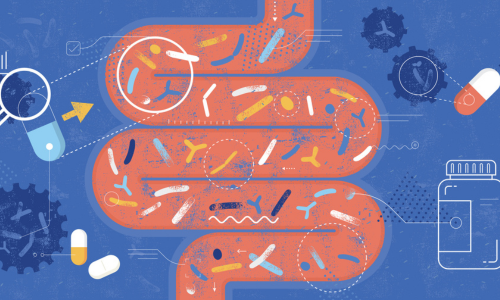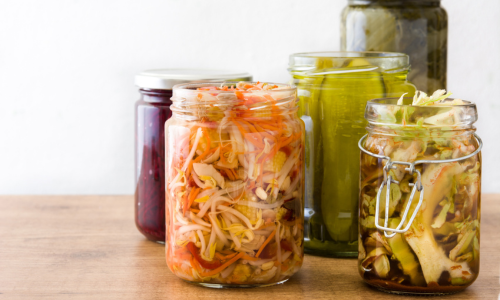Understanding Probiotics: What They Are and Where to Find Them
April 20, 2023

Probiotics seem to be everywhere - but what are they and what do they do? We see plenty of praise for them, but not many specific details of what makes them important. To explore this further, let’s back up and start with microbes. The term microbe on its own has a literal meaning of “small life”. How are microbes and probiotics related? Microbes include bacteria that influence our digestive health as well our immune system. To achieve a state of wellness, we actually require a balance of both good and bad bacteria in our gut microbiome. Well much of a healthy gut microbiome can be achieved through dietary choices, we can’t manage it all solely by what we eat and drink alone because what we eat and drink are not the only things that influence the status of our gut microbiome. Did you know that your gut microbiome can be influenced by emotional, psychological and physical stress? When we are stressed, it can lead to what is known as a “leaky gut”. This is when the permeability of our intestines is increased, allowing bacteria to move more easily into the bloodstream. This can eventually lead to chronic inflammation. A cycle then develops and continues that perpetuates the microbiome imbalance that may lead to indigestion, cramps, bloating, diarrhea or constipation. Sound familiar? If so, let’s explore ways that we can stop this uncomfortable internal cycle.
Enter probiotics. Probiotics are beneficial microbes that can help support the balance of bacteria that are already naturally present and vital to our digestive system. Probiotics produce important acids that discourage the growth of bad bacteria while encouraging the growth of good bacteria. Probiotics can nourish and replenish our gut health. It’s important to keep in mind, however, that the path from our mouths to our digestive tract is a long one. How and where probiotics are most helpful is determined by specific areas of need that are dependent on certain levels of acidity and alkalinity in our bodies (it’s important to note that oxygen also plays an important role in this process as well). As an example, the small intestines are more acidic than the large intestines. The large intestines have less oxygen available than the small intestines do. Fortunately, when it comes to regaining a balanced gut microbiome, we don’t have to pinpoint exactly where there exists an imbalance or the specifics of pH levels and oxygen availability (phew!). That’s because when provided with a quality source, our bodies instinctively know where each specific strain of probiotic will be most helpful, and passes them along to use where they will be most needed. The main goal is for the probiotic to help create balance and strengthen the intestinal lining to correct and prevent that leaky gut.
So now that we know what probiotics are and what they do, let’s talk more about the types of probiotics. Several factors can determine how quickly or intensely probiotics can have a positive impact on our digestive health. Did you know that quantity of those microbes mentioned earlier is in the trillions? This means that while our gastrointestinal systems all have the same purpose and function, our microbiomes are just as unique as our fingerprints. So, along with that level of uniqueness, other considerations like severity of symptoms, stress levels, and the possible presence of autoimmune disorders or other health issues could have an impact on how soon and how impactful probiotics will be for each person! No two gut microbiomes are alike, and no two bodies will respond exactly the same to probiotics. Fortunately, as we mentioned earlier, we don’t always need exactness in order to obtain effectiveness.
The most common source of probiotics from foods are from those that have been fermented. Why? Well, the process of fermentation helps break down nutrients in some foods, making them easier to digest. This fermentation process does tend to lead to an intense or tangy flavor; so it’s important when shopping for fermented foods to stay aware of any added sugars and/or sweeteners to these foods. If you’re following an MRC weight loss menu, you’re in luck because these menus already include several probiotic containing options such as: yogurt, sauerkraut, kimchi and pickles. Let’s take a look at each of these in more detail:

Yogurt is made from fermenting milk (or a non dairy product can also be used) with a start of culture bacteria. The probiotics in yogurt help break down lactose; so, if a person is lactose-intolerant, they may be able to digest yogurt easier than regular dairy products! If not, many brands offer dairy-free and vegan choices that can still also contain probiotics - just take a look at the nutrition label.
Sauerkraut is made from a combination of cabbage and salt. It not only offers the benefits of probiotics, but it is also an excellent source of fiber. Some people like to make their own, but if that’s not your jam, then you can also find it in most major grocery store chains too. Keep in mind that refrigerated products are more shelf-stable than the canned or jarred options.
Kimchi is a spicy Korean food, often served as a side dish, and is made from fermented cabbage and other vegetables. In addition to being a probiotic, a 2018 review in the Journal of Nutrition and Health found that kimchi offers benefits that extend beyond the gut microbiome. Kimchi can be found in the refrigerated section of grocery stores (near the sauerkraut and pickles) or near tofu and other vegan options.
Pickles are cucumbers that have been preserved in vinegar and salt. As mentioned above, the most beneficial choices from a probiotic standpoint will be found in the refrigerated section. Or you can make your own with a brine and your own selection of flavor from dill, peppercorn, mustard and coriander seeds!
While these foods are full of excellent health benefits, the fermentation process can produce a rather distinct and tangy flavor that won’t be agreeable with every palate. In many of these fermented foods, salt is added in large quantities for flavor and preservative properties. If you’re on a low-sodium diet, many of these fermented probiotic-containing foods might not be right for you. Be sure to increase your water intake on the days that you consume these foods to help offset the more than usual sodium consumptions.
For those that simply aren’t a fan of fermented foods, are abstaining from fermented foods, or simply don't want to eat fermented foods everyday, consider probiotic supplementation as a healthy and easy way to get in your daily dose of gut-healthy probiotics. At MRC, we’ve got two unique probiotic-containing products that are great for healthy guts:
- Super Fruit & Vegetable Drink: Rich in antioxidants and full of over 50 fruits and veggies, this great-tasting mix is fortified with a probiotic blend. While it can easily be enjoyed mixed with water, it can also be added to protein drinks or sugar-free tea or lemonade. Popular protein drink flavors to combine with Super Fruit & Vegetable Drink Mix include Peach Mango and Wildberry.
- MRC Complete Plus Multivitamin: These capsules contain a complex probiotic blend in one convenient serving, along with 15 essential vitamins and minerals. They are taken daily, preferably with breakfast or lunch, and available in formulations that address the unique needs of men and women.
Ready to take the next step with your health or weight loss routine by adding a probiotic but not sure exactly where to start? We can help! Send us an email to websupport@emetabolic.com with your questions.